

On September 17, 2025, the China-Hungary Anti-Cancer Summit was successfully held. The summit was jointly organized by China Anti-Cancer Association (CACA), Hungarian League Against Cancer (HLAC), and World Association for Integrative Oncology (WAIO). It attracted audiences from seven countries, including China, Hungary, the Czech Republic, Ukraine, Austria, Slovakia, and Romania. The total number of online views exceeded 13 million, demonstrating widespread attention and enthusiastic participation in the field of global cancer prevention and control.
The summit featured keynote presentations by five distinguished leaders and renowned experts in the field of oncology from China and Hungary. They are: Prof. Daiming Fan, President of CACA, President of Asian Oncology Society (AOS), and President of WAIO; Prof. Zhe'an Lin, President of Taiwan Science and Technology Association and President of Taiwan Medical Science Research Institute; Balázs Rozványi, President of HLAC, Board Member of the Hungarian Alliance of Patients’ Organisations, and Board Member of WAIO; Tamás Mátrai, Medical Director of National Institute of Oncology and Co-founder of Breast Surgical Center of Excellence at Tritonlife Private Hospital; and Prof. Kexin Chen, Director of Key Laboratory of Prevention and Control of Human Major Diseases of the Ministry of Education, Director of the Tianjin Key Laboratory of Molecular Cancer Epidemiology, and Chair of CACA Cancer Epidemiology Committee. The academic chairs of the summit were Prof. Binghe Xu, Deputy Director of the Academic Committee in Chinese Academy of Medical Sciences, Tenured Prof. of Peking Union Medical College (PUMC), and Standing Executive Member of CACA; Ákos Nagy from HLAC co-chaired the event. Vice President of CACA Prof. Ying Wang and President Balázs Rozványi delivered the opening remarks.
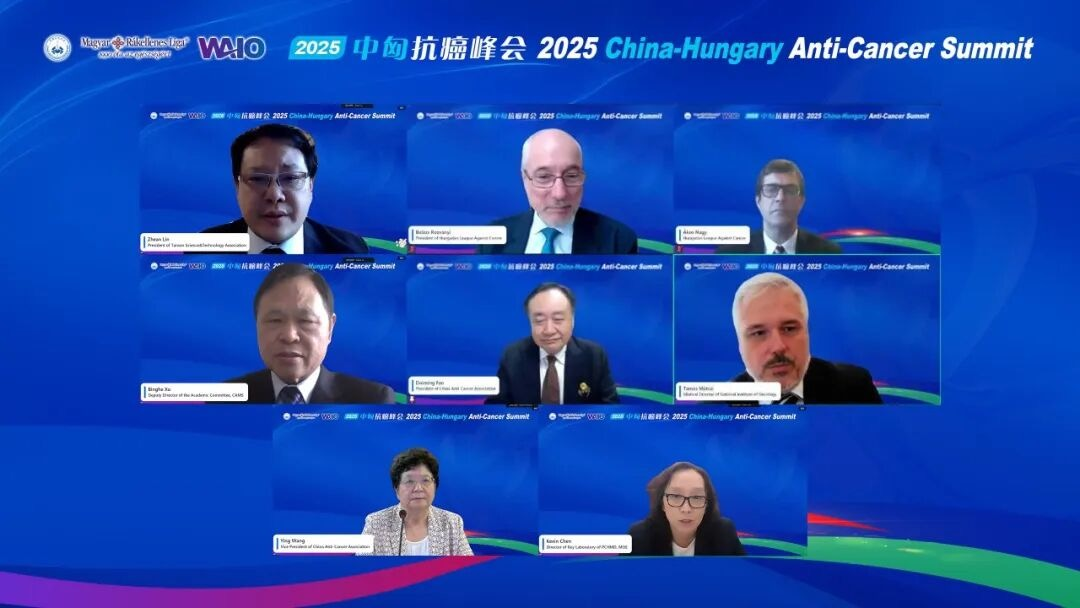
In her speech, Prof. Wang welcomed the participating experts from various countries, emphasizing the critical role of international collaboration in addressing global cancer challenges. She highlighted the progress made by CACA in promoting tumor diagnosis and treatment guidelines tailored to the Chinese population and building an international cooperation network for cancer prevention and control. She noted that the association has so far held 24 international summits and expressed hope that this conference would gather more wisdom to advance global cancer prevention and treatment. President Balázs Rozványi thanked CACA for organizing this grand event, pointing out that the summit’s focus on the current status and challenges of cancer diagnosis and treatment would facilitate the exchange of clinical techniques and experiences, ultimately benefiting patients. He looked forward to deepening mutual learning and cooperation between China and Hungary through academic exchanges, scientific research collaboration, and multidisciplinary dialogue to jointly enhance the level of cancer prevention and control, and wished the conference a complete success.
Releasing the Chinese Approach, Sharing Integrative Wisdom
Prof. Fan, President of CACA, President of AOS, and President of WAIO, delivered a keynote speech titled "Development of Holistic Integrative Management of Cancer in China." He systematically elaborated on the innovative concept of Holistic Integrative Management (HIM) for cancer in China, as well as the explorations and practices of CACA in promoting its implementation. Prof. Fan mentioned that China bears nearly one-quarter of the global cancer incidence and one-third of cancer deaths. Addressing localized prevention and treatment challenges, he emphasized the importance of developing clinical guidelines suited to national conditions, using the differences in liver and esophageal cancers between Eastern and Western practices as examples. To this end, CACA organized 13,000 experts to compile the "CACA Guidelines for Holistic Integrative Management of Cancer" (CACA Guidelines), covering 53 types of cancers and 60 technologies. These guidelines highlight full-cycle management from "prevention-screening-diagnosis-treatment-rehabilitation" and the unique Chinese diagnosis and management experience of "evaluation-support-control-care-survival." This systematic "Chinese approach" provides valuable theoretical support and practical pathways for building localized, high-efficiency cancer prevention and control systems globally, especially in developing countries.
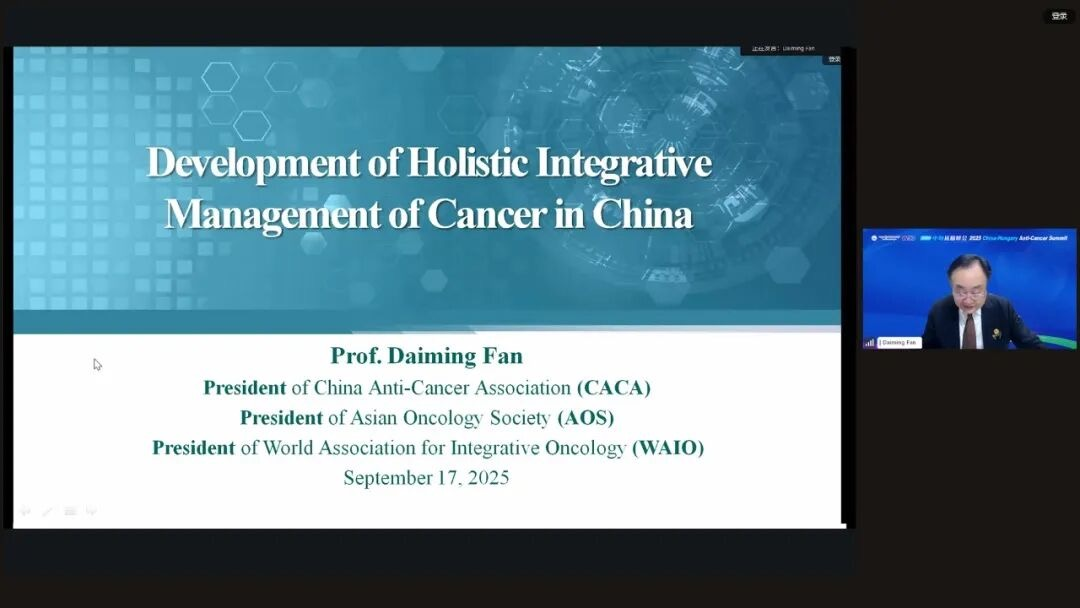
Hungarian Experience: Breakthroughs and Challenges in Breast Cancer Screening
Balázs Rozványi, President of HLAC, presented "Lessons Learned from the Hungarian Breast Cancer Screening Program." He systematically introduced the practices and challenges of the national breast cancer screening program for women launched since 2002. President Rozványi mentioned that the program faces the issue of participation rates below 70% among women and analyzed multiple barriers: lack of public awareness, practical execution obstacles, cultural and social factors, and limited medical support. However, biennial mammography screening has significantly improved the early diagnosis and cure rates of breast cancer. President Rozványi advocated for reducing cancer risks through healthy lifestyles and regular screening, while also introducing the alliance’s initiatives in screening promotion, patient rehabilitation support, and public education. He stated that Hungary plans to expand the screening age to women aged 40-70 in the future and explore multidisciplinary collaboration models with cardiovascular diseases, among others, to continuously optimize prevention and control outcomes.
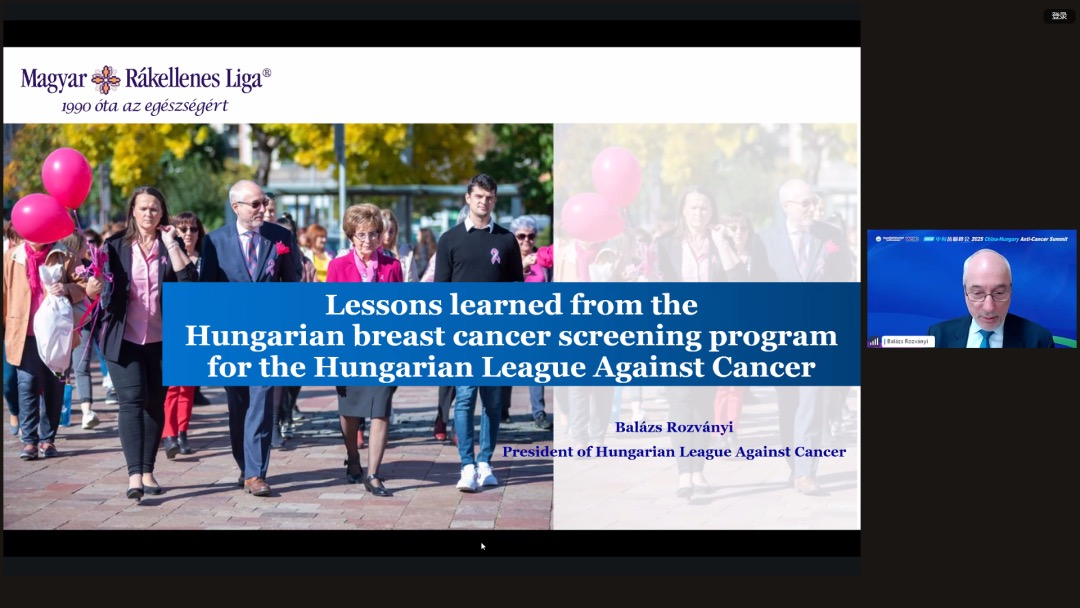
AI Empowers MDT: New Breakthroughs in Precision Cancer Treatment
Prof. Lin, President of the Taiwan Science and Technology Association and President of Taiwan Medical Science Research Institute, shared insights on the future trends of cancer treatment in his presentation titled "AI+MDT—Cutting-Edge Thinking in Cancer Treatment." Prof. Lin pointed out that artificial intelligence (AI) and multidisciplinary teamwork (MDT) are not only profoundly reshaping the landscape of cancer treatment but also providing a solid platform for cross-regional and cross-disciplinary medical collaboration—such as exchanges between the two sides of the Taiwan Strait—promoting more precise and humanized cancer treatment. He explained that AI can rapidly analyze genetic data and imaging information, achieving significant results in predicting immunotherapy responses and optimizing targeted drug selection. Through multiple clinical cases, Prof. Lin demonstrated how AI assists in identifying rare mutations and integrating traditional Chinese and Western medicine treatments, including innovative multi-target drugs from Prof. Xu’s team and the positive effects of the traditional Chinese medicine component PD616 in improving patients’ immune status. Prof. Lin also presented video case studies, proposing innovative ideas such as integrating physical frequency modulation to break through the limitations of traditional treatments.
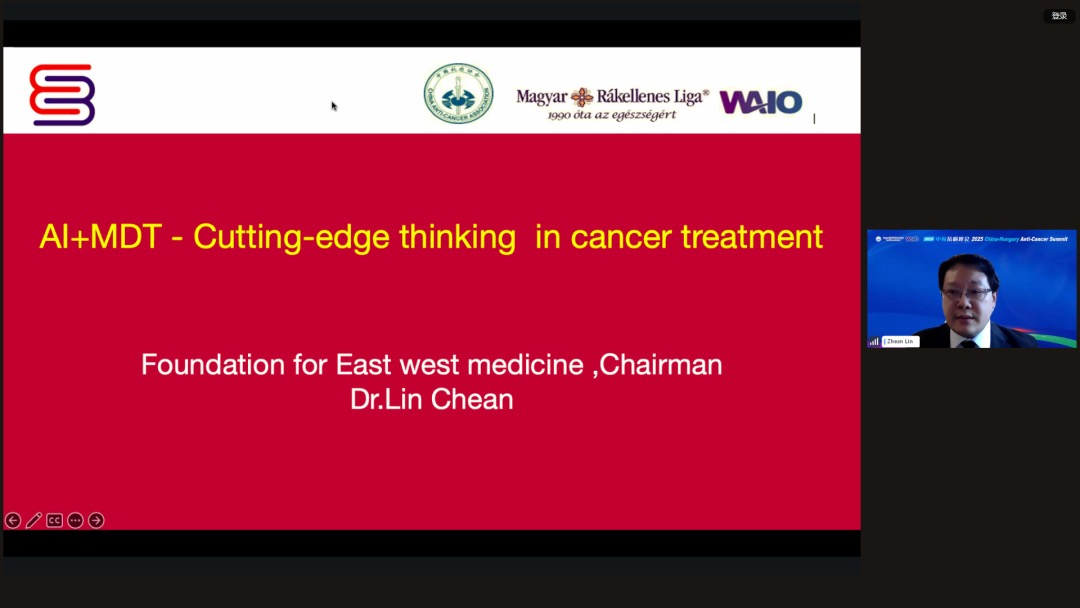
Current Status of Breast Cancer in Hungary: Progress, Challenges, and Cooperation
Tamás Mátrai, Medical Director of National Institute of Oncology of Hungary delivered a keynote speech titled "Breast Cancer Epidemiology and Care in Hungary:Progress, Challenges, and Collaborative Approaches." Director Mátrai mentioned that breast cancer is the most common malignant tumor among women in Hungary, and its incidence continues to rise. However, thanks to the national population screening program launched in 2002, the mortality rate has shown a declining trend, achieving earlier detection and better treatment outcomes. Hungarian patient organizations have significantly raised public awareness and screening participation through community advocacy and public activities, closely collaborating with the medical community to promote early diagnosis and treatment. The Hungarian Breast Cancer Consensus Conference has further standardized diagnosis and treatment by developing clinical standards and disseminating international guidelines, striving to continuously reduce the disease burden amid rising incidence rates.
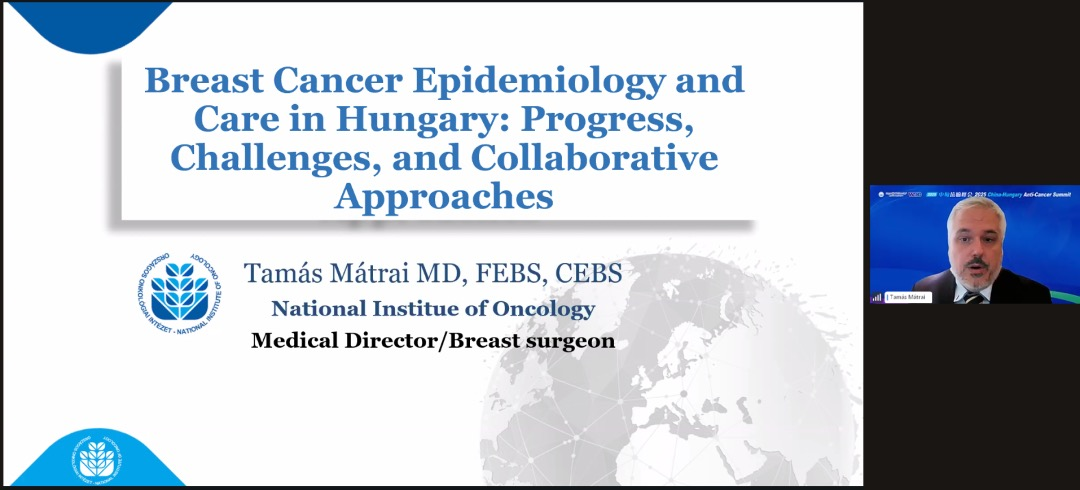
Toward Precision Prevention and Control: Challenges and New Intelligent Strategies for Breast Cancer Screening in China
Prof. Chen, Director of Key Laboratory Prevention and Control of Human Major Diseases of the Ministry of Education, Director of the Tianjin Key Laboratory of Molecular Cancer Epidemiology, and Chair of CACA Cancer Epidemiology Committee, delivered a report titled "Breast Cancer Screening In China: Current Evidence and Future Challenge." The report provided an in-depth analysis of the epidemiological characteristics, current status, and strategic evolution of breast cancer screening in China. It pointed out that breast cancer is the second most common cancer among Chinese women, with a rising mortality rate and a five-year survival rate lower than that in Europe and the United States. Screening programs such as CNBCSP and MIST have significantly increased early diagnosis rates, and the combination of mammography and ultrasound has effectively reduced mortality. The exploration and optimization of multi-cancer joint screening schemes provide new ideas for breast cancer prevention and control. Future prospects focus on multi-omics biomarkers, artificial intelligence technology, and cost-effectiveness optimization, aiming to promote personalized and intelligent screening strategies and provide high-quality scientific evidence for enhancing breast cancer prevention and control.
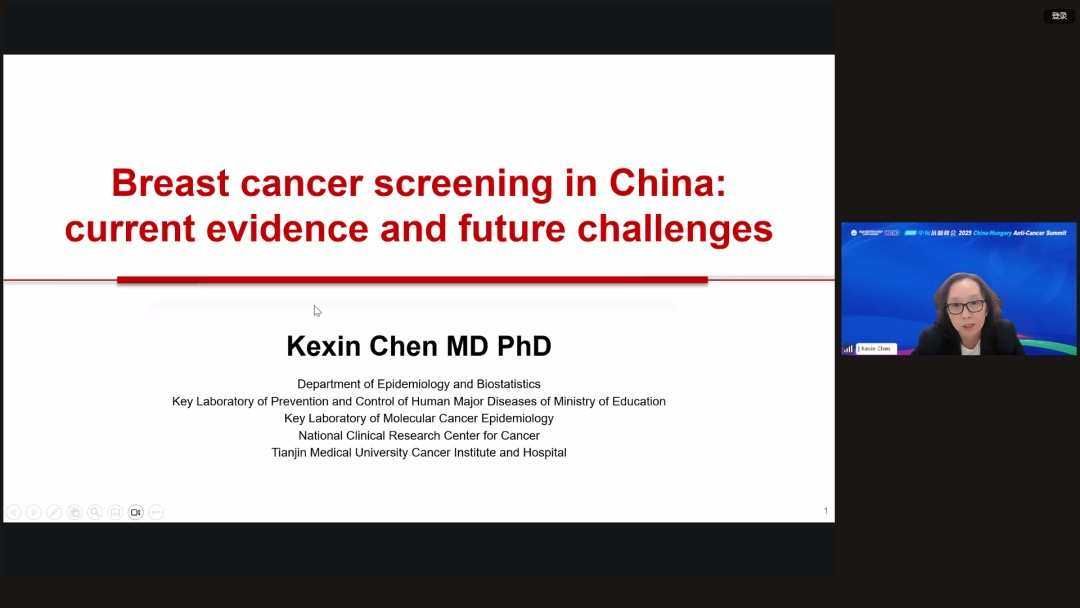
Sino-Hungarian Medical Dialogue Charts a New Vision for Anti-Cancer Efforts
During the round-table discussion, Chinese and Hungarian experts focused on cooperation in breast cancer prevention and treatment, addressing challenges such as early onset age and differences in tissue density. They proposed strengthening genetic testing for high-risk groups, AI-assisted imaging, and personalized screening strategies. Both sides agreed on the importance of patient education, the role of general practitioners, and the potential of traditional Chinese medicine in regulating the tumor microenvironment. Future medical cooperation between China and Hungary will also focus on data sharing, guideline optimization, and innovative research integrating traditional and modern medicine.
The China-Hungary Anti-Cancer Summit not only deepened mutual understanding in the field of cancer prevention and treatment but also laid a solid foundation for future transnational and interdisciplinary cooperation, further promoting integration and innovation in global cancer prevention and control.